October is here, and with it National Breast Cancer Awareness Month and a great annual opportunity to pause and ask yourself if you’re doing all you can to protect yourself from the disease that one in eight women will develop over her lifetime. Unfortunately, women don’t have control over most breast cancer risk factors, which include family history of the disease, genetic mutations, dense breast tissue, and the simple process of aging. Because of that, there is no sure way to prevent breast cancer. However, there are some lifestyle factors, including diet, that can reduce breast cancer risk — in some cases substantially.
Excess body fat is strongly related to increased breast cancer risk, explains Christine Zoumas, R.D., director of the Healing Foods Program at UCSD Moores Cancer Center. While reaching and maintaining a healthy weight is ideal, losing just 5 to 10 percent of body weight can decrease the risk of breast cancer, she says.
Overall, a diet filled with fruits, veggies, and whole grains is best for breast cancer prevention. “Plants contain phytochemicals, which help fight cancer,” says Zouma. A plant-based diet, according to the American Institute for Cancer Research, boasts benefits like enhancing the immune system, slowing the growth of cancer cells, and reducing inflammation, Zouma adds.
In fact, the three recommendations that most helped women reduce breast cancer risk were eating plenty of fruits, vegetables, and whole grains; being at a healthy weight; and drinking no more than one alcoholic beverage a day, according to a study published in “Cancer Epidemiology, Biomarkers and Prevention.”
Some foods, though, score especially high when it comes to preventing and fighting breast cancer. Here are 15 healthy foods, diets, and eating habits that can reduce the risk of breast cancer.
1. Avoid late dinners
People who eat dinner before 9 p.m. or wait at least two hours before going to sleep after eating have a 20 percent lower risk of developing breast or prostate cancers than late eaters who have dinner after 10 p.m. or go to bed soon after eating, according to a study released in July 2018 from researchers in Barcelona.
2. Load up on mushrooms and green tea
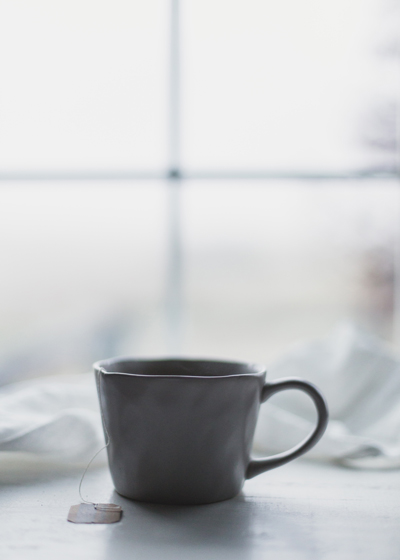
Researchers discovered that Chinese women who ate 10 grams or more of fresh mushrooms on a daily basis were nearly two-thirds less likely to develop breast cancer than those who didn’t eat mushrooms. What’s interesting here? Ten grams is the equivalent of just a small mushroom! The researchers, who published their findings in the International Journal of Cancer, also showed that drinking green tea could drastically lower breast cancer incidence rates. The study, which involved nearly 2,000 women, found that those who ate mushrooms and drank green tea on a daily basis had less than 18 percent of the breast cancer risk of women who consumed neither.
3. Follow the Mediterranean diet
Stephanie Bostic, R.D., recommends a Mediterranean diet to her clients who are interested in reducing their risks for breast cancer. The diet is made up of lots of vegetables and fruit, as well as olive oil, some whole grains and nuts, legumes, poultry, fish, eggs, and dairy, with a small amount of red meat and sweets, Bostic explains. A study published in “Nutrients” earlier this year found that those who faithfully followed the Mediterranean diet saw a 19 percent reduced risk of breast cancer, Bostic points out. “Small amounts of red wine may be included for post-menopausal women at high risk for heart disease, but I’d advise those most concerned about breast cancer to limit the wine,” she says.
4. Crunch on cauliflower and other cruciferous veggies
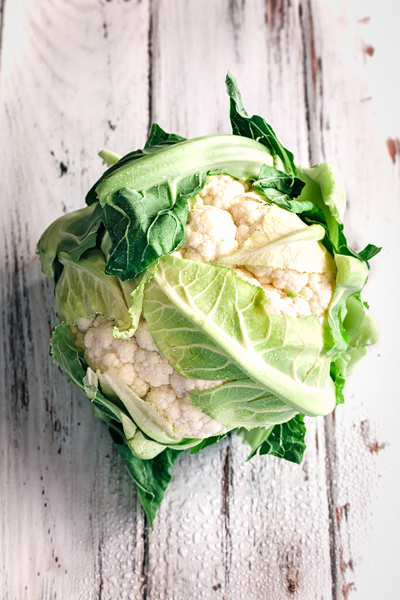
Registered dietitian Jill Nussinow, The Veggie Queen, highlights cruciferous veggies as powerful foods that can potentially prevent breast cancer. Crunchy cruciferous veggies have something in common: They contain sulforaphane, which can stop the growth of breast cancer cells. In addition to the common cruciferous veggies like cauliflower and broccoli, other cruciferous cousins include cabbage, kale, collards, bok choy, and kohlrabi, Nussinow says. Additionally, a study from Georgetown University in 2017 found that both cruciferous veggies and soy products like tofu and soy milk can reduce the side effects of breast cancer treatment among women.
5. Stock up on soy-rich foods
Soy-rich foods like miso soup, tofu, edamame, tempeh, and soy milk can all be powerful cancer-fighting foods. That’s because soy contains naturally occurring hormones like isoflavones, which scientists believe can inhibit the growth of breast cancer cells. Scientists continue to study Asian diets and their role in breast cancer prevention as breast cancer incidence rates tend to be lower in Asian countries.
6. Sardines, seaweed, and SLEEP!
Some of the best nutrients to keep breasts healthy are iodine and DHA, explains Leland Stillman, M.D. and the founder of Live Healthy. Both of these nutrients are abundant in fish, and seaweed is known for being high in iodine. Stillman suggests focusing on small fish like sardines because they are lowest in mercury. His other advice? Get to sleep early to maximize your melatonin production. Late nights and shift work can increase breast cancer risk, regardless of what you eat, he says.
7. Carb-load the healthy way with chickpeas and other legumes
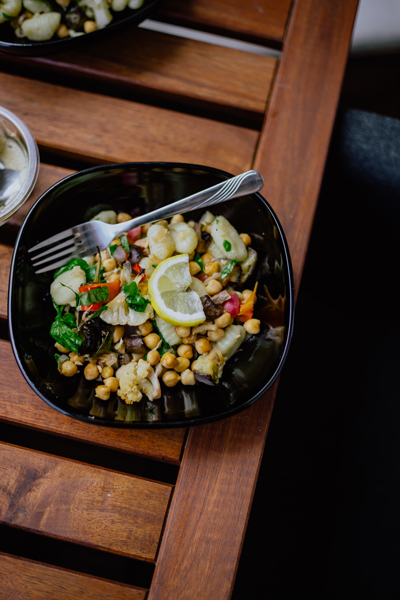
To really get this right, add chickpeas, fava beans, or black beans to a veggie-rich salad. Researchers found that bad carbs (think: highly processed ones found in pizza and burgers) can increase prostate and breast cancer risks. But, healthy carbs like legumes, non-starchy vegetables, fruits, and whole grains combined to reduce breast cancer risks by 67 percent.
“One of the most important findings here is that the type of carbohydrate-containing foods you consume can impact your cancer risk,” said Nour Makarem, a Ph.D. student at New York University and the study’s lead author, in a news release. “It appears that healthy carbohydrate sources, such as legumes, tend to protect us from cancer, but non-healthy ones, such as fast foods and sugary beverages, seem to increase the risk of these cancers.”
8. Reach for the right kind of “cocktail”
A team of researchers from Louisiana State University tested chemical nutrients and came up with a cocktail that proved to be effective at suppressing breast cancer cell growth by more than 80 percent. The “super cocktail” was made up of six nutrients: turmeric; isoflavone from soybeans; indo-3 carbinol derived from cruciferous veggies; c-phycocyanin from spirulina; resveratrol from grapes; and quercetin, which is a flavonoid found in fruits, vegetables, and tea. The combination also led to breast cancer cell death in the study.
9. Go fishing for your vitamin D
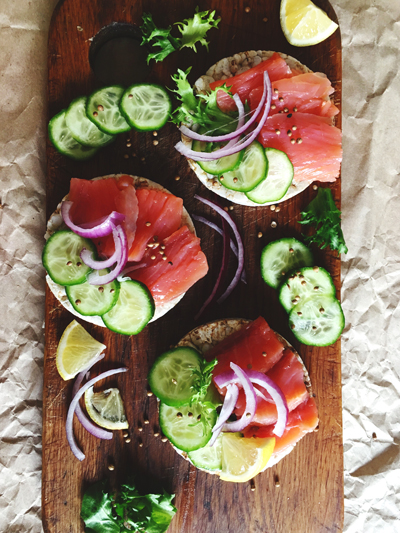
Higher levels of vitamin D are associated with decreasing risks of breast cancer, according to new research from the University of California San Diego School of Medicine published in June 2018. When it comes to foods that are rich in vitamin D, fatty fishes like salmon, mackerel, and tuna all rank high. The vitamin can also be found in other sources like egg yolks and milks fortified with vitamin D.
10. Spice things up with plenty of hot peppers
We know that capsaicin, the ingredient that gives cayenne and chili peppers their spicy kick, can help rev up metabolism. But did you know that same spicy ingredient can also help fight breast cancer? German researchers in 2016 found that capsaicin inhibits the growth of breast cancer cells.
11. An apple a day…
In a study involving rats, food scientists from Cornell University were able to show that eating apples on a daily basis could reduce breast cancer risks. The scientists also credited the phytochemicals in fresh apples to stopping liver and colon cancer cell growth in humans. Their findings linking apples to reduced breast cancer risk were published in the “Journal of Agriculture and Food Chemistry.”
12. Cue the carrots
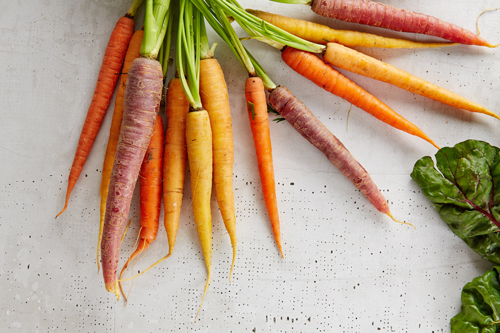
Of course you know that carrots are great for eyesight, but the high concentration of carotene in carrots can also help lower breast cancer risk, several studies have shown. One 20-year study published in the “American Journal of Clinical Nutrition” found that women who had high concentrations of carotene and lycopene (which is found in tomatoes and other red fruits and veggies like watermelon and papayas) reduced their risk of breast cancer by as much as 28 percent. The study concluded that carrots could also protect against the more aggressive forms of breast cancer.
13. Sprinkle in some flaxseed
Flaxseed, a great addition to smoothies and yogurt parfaits, is high in fiber and can help reduce inflammation. A 2005 study found flaxseed also has potential to help reduce the growth of tumor growth in patients with breast cancer.
14. Go nuts
Most nuts deliver a healthful punch, but walnuts just might be the MVPs. The combination of omega-3 fatty acids, antioxidants, and phytosterols found in walnuts can help reduce the risk of breast cancer, according to researchers. Several animal studies have demonstrated that walnut-rich diets slow or prevent the growth of breast and prostate cancers, according to the American Institute for Cancer Research.
15. Don’t shy away from lots of garlic
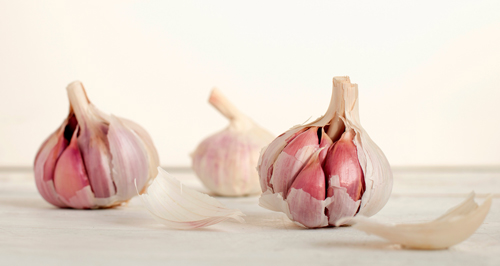
Garlic is among a few foods that the American Institute for Cancer Research specifically recommends for cancer protection. Animal studies have shown that components in allium vegetables (like garlic, leeks, scallions, onions, and chives) can slow the growth of cancer in various stages in breast cancer, as well as cancers of the stomach, esophagus, colon, and lung.
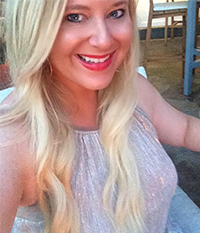 Brittany Anas is a freelance writer who specializes in health, fitness and travel writing. She also contributes to Men’s Journal, Women’s Health, Trip Savvy, Simplemost, Orbitz, and Eat This, Not That! She spent a decade working at daily newspapers, including The Denver Post and the Daily Camera in Boulder, Colorado, and she is a former federal background investigator. In her free time, Brittany enjoys hiking with her gremlin-pot belly pig mix that the rescue described as a “Boston Terrier” and coaching youth basketball. She also works with domestic abuse survivors, helping them regain financial stability through career coaching. Follower her on Twitter and Instagram.
Brittany Anas is a freelance writer who specializes in health, fitness and travel writing. She also contributes to Men’s Journal, Women’s Health, Trip Savvy, Simplemost, Orbitz, and Eat This, Not That! She spent a decade working at daily newspapers, including The Denver Post and the Daily Camera in Boulder, Colorado, and she is a former federal background investigator. In her free time, Brittany enjoys hiking with her gremlin-pot belly pig mix that the rescue described as a “Boston Terrier” and coaching youth basketball. She also works with domestic abuse survivors, helping them regain financial stability through career coaching. Follower her on Twitter and Instagram.
